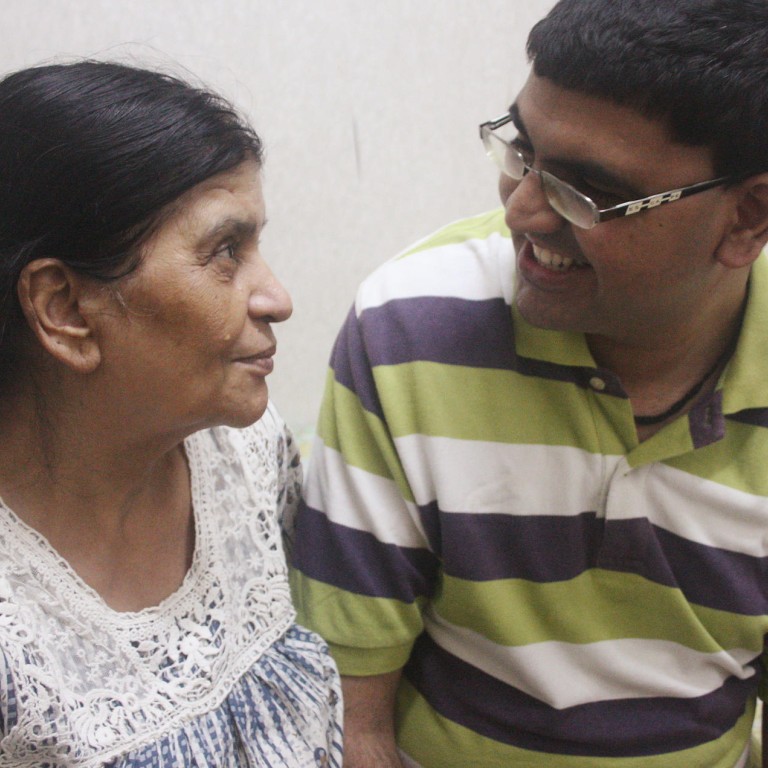
My mother, my friend and hero
Multiple sclerosis has taken its toll on Prakash Punjabi over the years and mum Indira has been by his side throughout the tough journey
Prakash Punjabi clearly remembers being 10 years old.

On August 2 he was sent for an MRI - and aged 10, there it was - the diagnosis was multiple sclerosis (MS).
Now aged 24, Punjabi sits on his bed in the family flat in Nathan Road, Jordan.
The Sri Lankan helper, Nadeesha Wanidasoori, brings a drink and his mother shyly observes the interview from the living room, while watching a Hindi TV series.
Punjabi is an upbeat person. He laughs easily and says that his mum has been nervous about the interview all week. Outside, in the living room, plastic bottles stand on a table - they are easier for Punjabi to grip these days than a glass.
The symptoms of MS were not immediately apparent. "At the beginning it was OK, I was so normal. Then later as the years went by I would have MS attacks or relapses and slowly degraded. Then in December 2004 I had a fall which led me to use the wheelchair."
It has been a tough journey for Punjabi. In school, teachers would ask what he felt were invasive questions about his illness and at the Delia Memorial School (Hip Wo) in Kwun Tong, which he attended, he was told by others in his class that he didn't belong.
"My classmates would stay stuff like: 'you don't belong here'. My hands would tremble, so I couldn't write. I couldn't run because of my legs. The MS affected my motor skills. I was different from the rest.
"One 'friend', I won't name him, even suggested I should jump off a building. Every day I would go home crying because my classmates made fun of me. It was really heartbreaking," he says.
Opposite the bed a small fan stands on a chair which has been converted into a portable commode. "My washroom is different from others," says Punjabi.
"I have a plastic commode in a chair. I am overweight so my mum and the helper help me to transfer from the mobile commode to the bed.
"Every week I go to the [Tung Wah] hospital for injections of Interferon and they put the injections into my thighs and stomach. I often don't feel well afterwards," he says.
The drug is used to help boost the immune system. His mum quietly comforts and encourages him, and spoon-feeds him when he becomes too tired to feed himself.
Punjabi would like to nominate his mother, Indira Punjabi, for the Spirit of Hong Kong Awards. "She always helps me and encourages me, she is my friend and really my hero."
The mother and son get on well. He readily teases her and yet recognises the concern that his MS has caused her, and the strain of the regular hospital visits.
Indira Punjabi, 65, has lived in Hong Kong for the past 35 years after coming here from Calcutta.
What concerned her, she says, when her son was 10, was that he couldn't control the trembling in his leg.
MS is an inflammatory disease which disrupts the ability of the nervous system to communicate after the insulating covers of nerve cells in the brain and spinal cord are damaged.
"My mother was in Calcutta," says Punjabi, "my father was in Ajmer. My father came here first and then invited my mother to join him. My mother is very supportive - over my failures to do normal things like normal people, she just says never mind.
"I sometimes feel so angry and frustrated, but she just says never mind, it isn't worth it, and stuff like that.
"I can't carry a full glass because my hands tremble and she just says it's not worth me getting frustrated," he says.
Punjabi enjoys surfing the internet. "I like Facebook and reading. At high school we were given homework to watch and read the news. That's how I got addicted to the SCMP [ ]. I read with my mum … And we also watch Hindi films and TV series together," he says.
